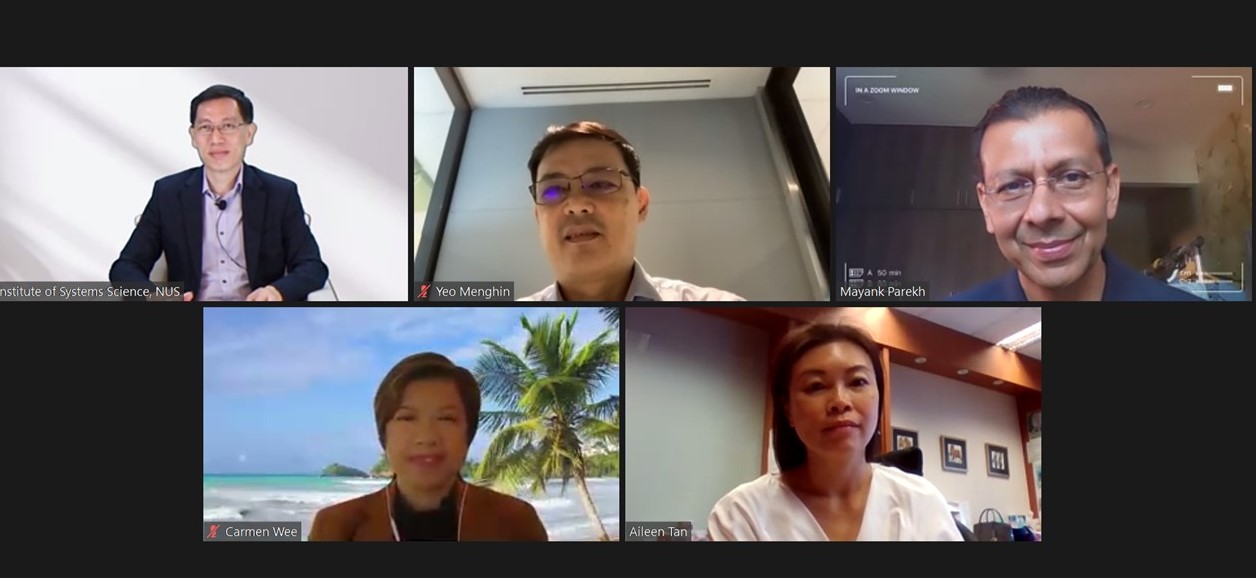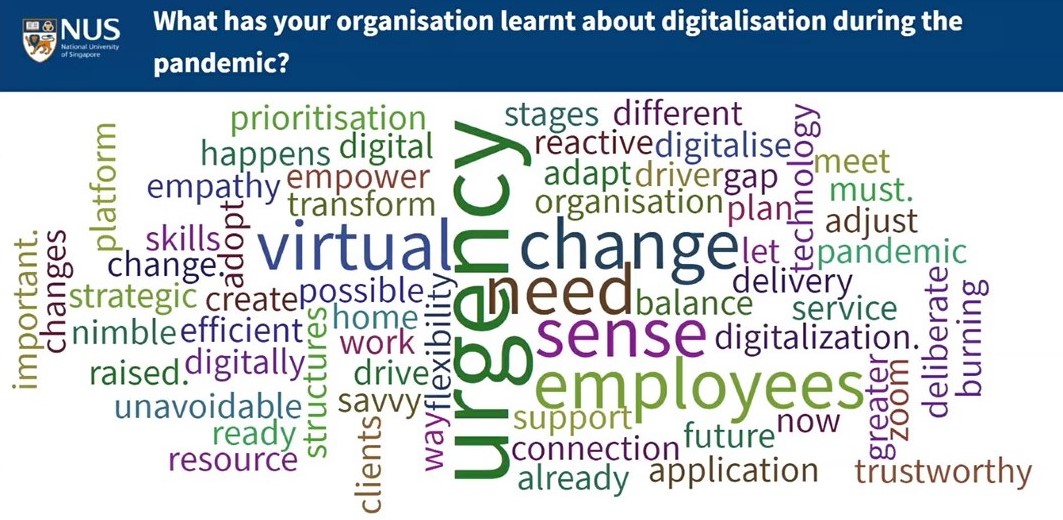
Clockwise from top left to right: (Khoong Chan Meng, CEO of NUS-ISS; Yeo Meng Hin, Director of Group Human Resources, Keppel Corporation; Mayank Parekh, CEO, IHRP; Carmen Wee, Board Member, HTX and Aileen Tan, Group CHRO, Singtel at the NUS-ISS exclusive CHRO 4.0 roundtable)
The fourth industrial revolution – compounded by various economic developments and smart city initiatives around the world – have nudged many companies to begin their digital transformation journey. COVID-19 which we have learned and tackled with for about ten months now, has turned this nudge into a forceful push. Companies had to digitalise and transform overnight since its onset in January earlier this year and adjust to a new normal.
“The COVID-19 pandemic is a crisis, but also an opportunity,” said Khoong Chan Meng, Chief Executive Officer, NUS-ISS. He highlighted an observation made over the last few months – that whether a company is able to rise above the challenges, has to do with whether they have the right talent and skillsets to help them through this journey. “At the heart of it, digital talent is the ultimate enabler of digital transformation,” he emphasised.
The sentiment was echoed by panelists at a roundtable titled 'CHRO 4.0: Digital Talent in the New Normal', organised by NUS-ISS and moderated by Chan Meng. Held virtually on 19 October, the roundtable comprised human resource leaders from various industries, who shared about what their organisations have learnt from the COVID-19 pandemic, as well as how digital transformation has changed the way companies hire and develop talents.
Never let a crisis go wasted
“One interesting thing that happened this pandemic season was that we became experts at using digital communication tools overnight,” said Aileen Tan, Group CHRO, Singtel. She explained that, "Singtel has over 25,000 employees across the globe, due to the sheer scale, it has taken more time to roll out a digitalisation plan. But when we were forced to work from home, we can no longer drag our feet to use these digital tools – we jumped right into it.” Aileen also stressed that it is important not to let a crisis go wasted. “COVID-19 has presented us with the chance to take stock and rethink about the ways that we do things. Along the way, we have built new muscles and capacities, and I think there are some useful ones that we can continue to leverage in the future.”
Mayank Parekh, Chief Executive Officer, IHRP (Institute of Human Resource Professionals), chimed in his agreement, adding that the last few months have presented tremendous opportunities for the HR profession itself. “Prior to the pandemic, there had been challenges in getting the HR sector to adopt existing digital tools for their work – be it talent recruitment or employee engagement and development.” But now, HR professionals no longer have the choice. “It has become a real imperative. We have had to recruit remotely, use digital tools to conduct interviews, and figure out how to get a pulse on employee sentiment when we can’t have face time.” This has forced companies to take a serious look at leveraging the HR solutions out there.

A real-time poll and sentiments from the attendees on the question, 'what has your organisation learnt about digitalisation during the pandemic.'
Digital talents can be developed, not just hired
A unique paradigm shift in the fourth industrial revolution is in the way human meets the cyber world. The boundaries between human and technology are increasingly blurred, and this has allowed the speed of breakthroughs to happen without historical precedent. A Willis Towers Watson’s study for the Ministry of Manpower and IHRP¹ noted that almost 90% of HR job roles today will be impacted by technology. Fundamentally, this upends the traditional way in which employers have been hiring talents for the last couple of decades.
Carmen Wee, Board Member, HTX (Home Team Science & Technology Agency), said, “A lot of companies tend to be stuck in the mindset of wanting to find somebody who fits 100 per cent of the job description. But the fact is, some of these job roles don’t exist just a few years back. And for certain emerging job scopes, you may not be able to find anyone with the exact experience." Mayank added, “Particular in the ICT industry, we see demand outstripping supply, and therefore companies will need to be a lot more flexible in trying to identify the talents that you will need.” He suggested that companies take proactive steps in providing their own requirements. “This is where HR can work closely with the business teams to identify critical skillsets they are looking for in new talents. Bring these promising people onboard, chart a growth plan for them, and develop these new hires into the digital talents you need.”
Yeo Meng Hin, Director of Group Human Resources, Keppel Corporation, talked about the importance of engaging employees in the digital transformation journey. “In addition to talent recruitment, HR and business units should also support each other in creating a burning platform. At Keppel, we set up a Technology Advisory Panel which brings in thought leaders from different industries to educate our employees on the new technological innovations that are happening.” This creates a knowledge base, and readies employees for the short- and long-term changes that digitalisation will bring.
Concluding the roundtable, Chan Meng highlighted that an important part of moving forward in the new digital normal, is to ensure no one gets left behind. “Having compassion and an open-mind to try new ways of doing things, is critical in a rapidly changing world.We are all learning at the same time, in these unprecedented times, and it is this willingness to learn and adapt to different needs and perspectives, that will enable a company to forge ahead in as a single learning organisation.”
_____________________________________________________________________
¹
Address at HR Tech Festival Asia 2020 SMS Zaqy Mohamad, Virtual Conference, mom.gov.sg, 30 September. 2020. Web. October 2020.